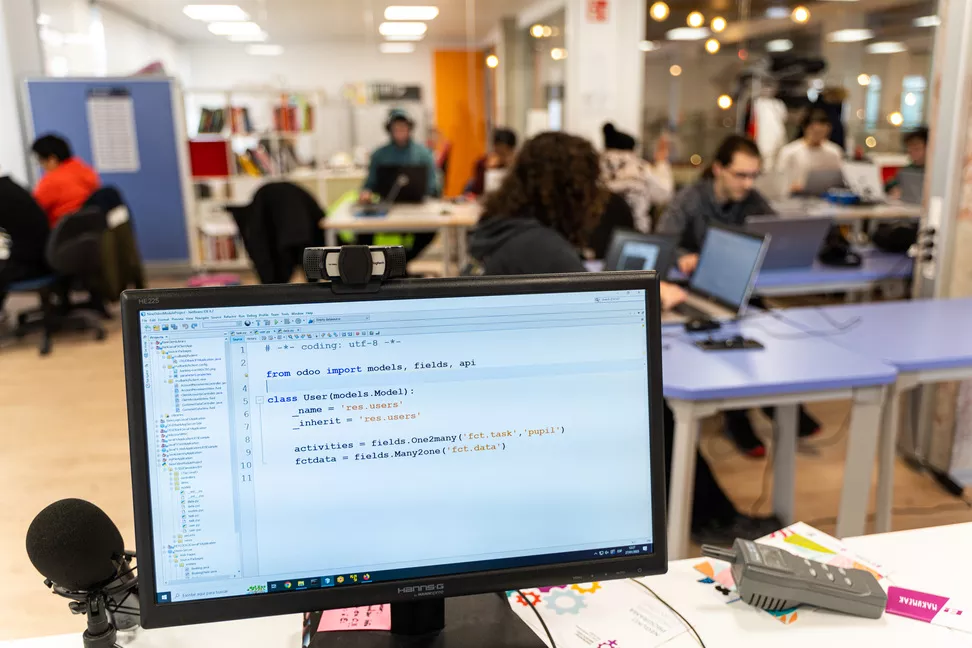Developing, installing, documenting and maintaining multi-platform computer applications, using technologies and specific development environments, guaranteeing secure access to data and complying with «usability» and quality criteria required by established standards.
These teachings include the knowledge required to carry out basic level activities for the prevention of occupational risks.
| Professional Module | Hours-total | Year |
| Databases | 198 | 1st |
|
Programming
|
264 | 1st |
|
Markup Language and Information Management Systems
|
132 | 1st |
| Development Environments | 99 | 1st |
|
Professional English
|
60 | 1st |
| Personal itinerary for employability I | 120 | 1st |
| Digitalization applied to productive sectors | 60 | 1st |
| Sustainability applied to productive sectors | 30 | 1st |
|
Computer Systems
|
165 | 2nd |
|
Data Access
|
120 | 2nd |
|
Interface Development
|
140 | 2nd |
|
Multimedia Programming and Mobile Devices
|
100 | 2nd |
|
Services and Processes Programming
|
80 | 2nd |
|
Business Management Systems
|
100 | 2nd |
|
Intermodular project
|
50 | 2nd |
| Personal itinerary for employability II | 63 | 2nd |
| Optional modules | 84 | 2nd |
Access to the High-level courses or modules requires compliance with at least one of the following conditions:
- To be in possession of the Post-compulsory High School Diploma or a certificate proving that all subjects of the Post-compulsory High School have been passed.
- To have passed the third year of the Unified and Polyvalent Baccalaureate (BUP): Accreditation through academic certification of having passed all subjects leading to the Post-compulsory High School regulated by Law 14/1970, of 4 August, on General Education and Financing of Educational Reform, after completing the third year of aforesaid studies (Order EFP/1210/2021 of November 2, which establishes the equivalence, for the purposes of access to vocational training courses, of certain studies and qualifications prior to the current education system).
- To have passed the second year of the Experimental Post-compulsory High School (Bachillerato experimental).
- To be in possession of a Technician certificate (Intermediate-level Vocational Training).
- To be in possession of a Higher Technician or Specialist Technician certificate, or equivalent for academic purposes
- To have passed the University Orientation Course (COU).
- To be in possession of any university degree or equivalent.
- To have passed the entrance exam for higher-level training courses (it will be required to be at least 19 years old in the year the test is taken or 18 for those who have a Technician’s degree).
- To have passed the university entrance exam for those over 25 years old.
Either you work:
In public or private entities of any size, both employed and self-employed, in the area of multi-platform software application development in various fields: business and corporate management, customer relations, education, leisure, mobile devices and entertainment, among others; applications developed and implemented in intranet, extranet, and internet environments; implementation and adaptation of enterprise resource planning systems and customer relationship management systems.
The most relevant jobs are the following:
- Developing computer applications for business and corporate management.
- Developing general purpose applications.
- Developing applications in the field of entertainment and mobile computing.
Or you continue studying:
- Professional specialization courses.
- Another Higher-level Vocational Training course with the possibility of establishing validations of professional modules in accordance with current regulations.
- University studies with the possibility of establishing validations in accordance with current regulations.
This professional will be able to:
- Configure and operate computer systems, adapting the system’s logical configuration according to usage needs and established criteria.
- Manage databases, interpreting their logical design and verifying data integrity, consistency, security, and accessibility.
- Develop multi-platform applications with database access using languages, libraries, and tools tailored to specifications.
- Develop interactive graphical user interfaces with appropriate usability, using standard visual components or implementing specific visual components.
- Develop multiprocessing and multithreading applications using specific libraries and programming techniques.
- Participate in the implementation of ERP-CRM systems, evaluating the usefulness of each of their modules.
- Manage information stored in ERP-CRM systems, ensuring their integrity.
- Develop custom components for an ERP-CRM system, meeting established requirements.









